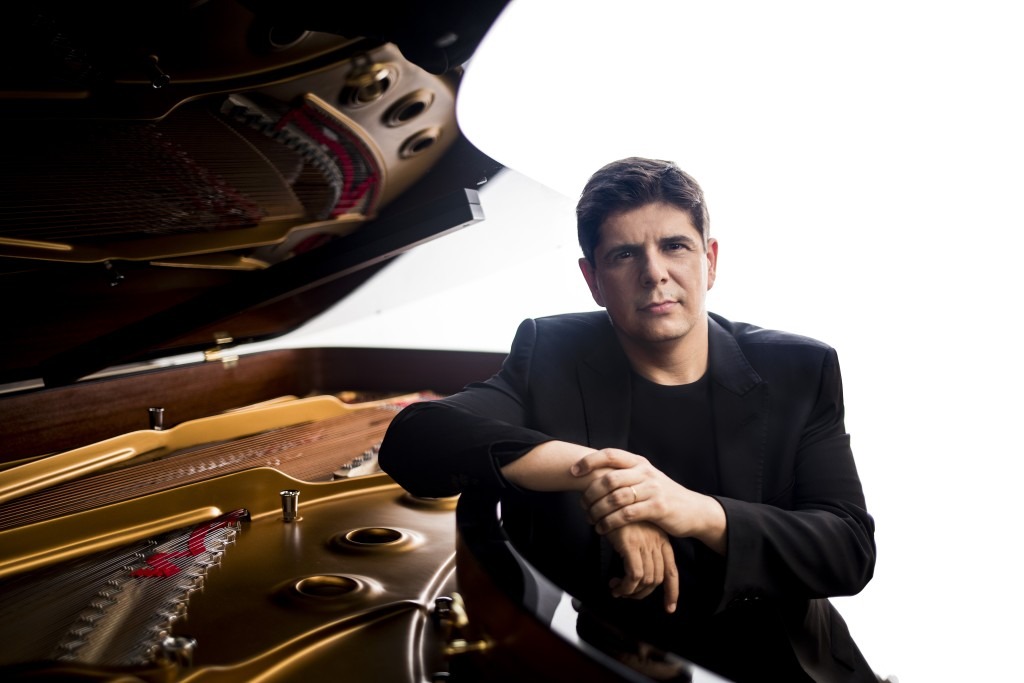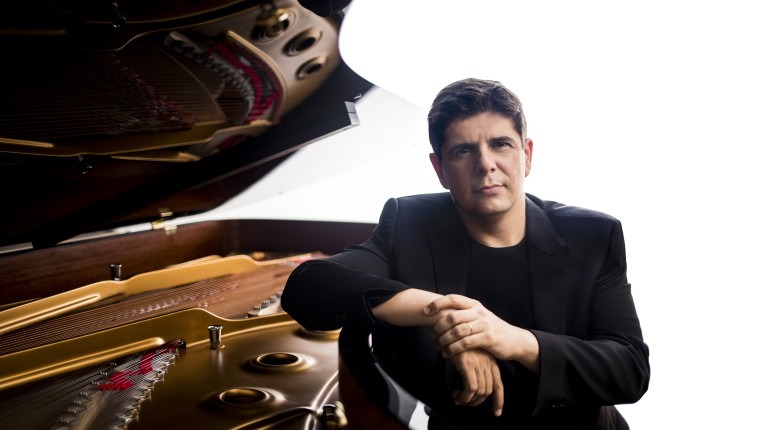while trying to express something new
February 23-25
Tampa, St Pete & Clearwater
Details here
Years ago, I attended a concert at the University of South Florida Sun Dome, a lavishly advertised appearance by the late great tenor, Luciano Pavarotti. The place was packed, some seats selling at $500 a pop – and his fans swooned over every note.
It was delicious entertainment to see and hear the big man sing, but something else occurred to me. The program itself – arias by Verdi, Puccini and Leoncavallo – seemed to take a backseat.
It didn’t matter what was cued up because Pavarotti loomed larger than the composers. In other words, marquee took precedence over message.
Many performers sell out a concert long before they commit to a program, as their name dominates − it’s what sells tickets. But this raises a question – can a performer get in the way of a composer?
I posed this and other ideas to Javier Perianes, the 45-year-old Spanish pianist who appears this weekend with The Florida Orchestra in Beethoven’s Piano Concerto No. 5, the Emperor. Also on the program is Richard Strauss’ A Hero’s Life.
“I honestly feel that the music always goes first and our main goal as musicians is to be just a kind of translator of what we think the composer may want,’’ he says.
“Of course, in that process, something from you will be inevitably present in the music you’re conveying, but the performer would never go first.’’
Pop music is way ahead of classical in shining the spotlight on the performer. But Taylor Swift singing her own songs is a far cry from a pianist playing Beethoven. Swift is both the composer and performer, so she’s a conduit to herself.
Perianes, on the other hand, must interpret Beethoven – respecting the score as written while at the same time expressing a point of view. So, where Swift is directly linked to her audience, Perianes must first go through Beethoven in reaching his listeners.
“Our challenge as musicians is to convey a message, by being just the messenger between the composer and the audience,’’ he adds.
“It’s impossible not to leave some kind of fingerprint of yourself on the piece, but I honestly try to intervene and interfere as little as possible. Being yourself is already being different and unique.’’
Perianes will undoubtedly leave his fingerprint on the Emperor, a work most every professional concert pianist must conquer. Cast in E-flat major, Beethoven’s “heroic’’ key, the concerto is a dialog among equals – soloist and orchestra carry the same assertive weight throughout – although the piano is the hero of this story.
Its war-like rhythms, pointed melodies and bold character led Florida Orchestra music director Michael Francis to say that it “encapsulates the heroic struggle of the individual and how one determined soul can influence the world around him to a magnificent degree.’’
Unlike most concertos up this time (1809), Beethoven introduces the soloist at the onset, overturning the tradition of a lengthy orchestral exposition. The piano enters like a wave crashing on shore as it unleashes a wash of notes in all directions. That’s no easy assignment.
“There are so many different aspects (of difficulty) to consider,’’ Perianes says. “Finding the right balance between poetry and heroic, establishing fluid communication with the orchestra, considering this concerto as a great chamber music piece, and giving some unity of concept in terms of articulation, phrasing and sound to the whole concerto.’’
So much of Beethoven’s popularity rests on his power, a full-throttled energy that tests a performer emotionally as well as physically. That takes a bit of athleticism.
“I think we’re doing some kind of elite sport because of the muscles we use and the amount of time you spend practicing,’’ Perianes says. “There is, of course, a physical part to the preparation, and so you should be in a good form mentally and physically. I think it’s important to be as fresh as possible, to rest, eat healthy food and exercise.’’
Power aside, Beethoven is also known for his slow movements, which bring tenderness and lyricism to his symphonies, chamber works and sonatas. Imagine the opening and closing movements of his Ninth Symphony unmoored from the central adagio that brings them to life.
The Emperor is no different. The adagio is Beethoven on a spiritual high, the piano’s delicate, ascending melody set against muted strings in what sounds like a hymn. Leonard Bernstein was so enamored by this music that he borrowed its central theme for the song Somewhere in his musical West Side Story.
“The beauty is in its simplicity,’’ Perianes says. “I agree on the feeling that this movement is one of the most sublime in the repertoire and that the simplicity is what creates its difficulty.
“This goes back to the intervention that an artist could have on the music and the effect it could cause. But sometimes, such as here, less is more.’’
The Florida Orchestra
Friday, February 23 at 8 pm
Straz Center, Tampa
Saturday, February 24 at 8 pm
Mahaffey Theater, St. Petersburg
Sunday, February 25 at 7:30 pm
Ruth Eckerd Hall, Clearwater
Details here
Originally published in the Florida Orchestra Blog






